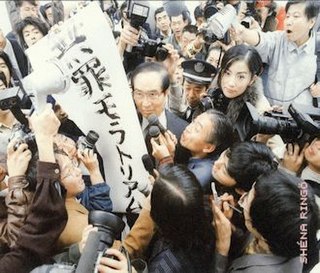
Chitose Hajime is a Japanese singer from Amami Ōshima. She sings in the shima-uta style particular to that region, with distinctive falsetto effects.
Seiji Kameda is a Japanese music producer, arranger and bass guitarist. He has worked extensively with Ringo Shiina, serving as her producer and touring bassist for many years, including his tenure with their band Tokyo Jihen.
The discography of Japanese pop rock band Glay consists of sixteen studio albums, forty-two unique singles, twenty-seven video albums, and sixty-four songs associated with various promotions.
Little Busters! and Little Busters! Ecstasy are visual novels developed by Key and published by VisualArt's in 2007 and 2008. The story follows Riki Naoe, a high school student and member of a close-knit group of friends who call themselves the Little Busters. It was adapted by J.C.Staff into two anime television series broadcast between 2012 and 2013, and an original video animation series to be released in 2014, directed by Yoshiki Yamakawa with music direction by Shinji Orito. The discography of Little Busters!, Ecstasy, and the anime adaptations consists of one compilation album, one EP, eight singles, three soundtracks, and five remix albums.

Toki no Tsubasa is the ninth album by Zard, released on February 15, 2001, by B-Gram Records.

Muzai Moratorium (無罪モラトリアム), also known as Innocence Moratorium, is the debut studio album by Japanese singer and songwriter Ringo Sheena, released on February 24, 1999, by Toshiba EMI. The album debuted at #2 and has sold over 1,433,000 copies. The album was certified triple platinum by the RIAJ for 1,200,000 copies shipped. The album was named number 3 on Bounce's 2009 list of 54 Standard Japanese Rock Albums.

Life Is... is the fifth original studio album by Japanese singer Ken Hirai, released by Defstar Records on January 22, 2003. It reached number one on Japan's Oricon sales chart and has been certified for one million sales by the Recording Industry Association of Japan.
Precious Junk is the debut single released by Japanese singer, Ken Hirai. It was released on May 13, 1995, under the label DefSTAR Records. The single charted for nine weeks, selling 44,000 copies, and peaking at #50 on the Oricon charts.

"Honnō" is Japanese singer Ringo Sheena's 4th single and it was released on October 27, 1999, by Toshiba EMI / East World. The single was certified double platinum by the RIAJ for 800,000 copies shipped to stores, and later gold for 100,000 downloads to cellphones in 2011.

"Tsumi to Batsu" is Japanese singer Ringo Sheena's 6th single and it was released on January 26, 2000, by Toshiba EMI / Virgin Music. It was certified double platinum by the RIAJ for 545,730 copies shipped to stores.

end=Start / Shuuten ~Kimi no Ude no Naka~ is the thirteenth single by Japanese pop/rock artist misono. The single charted at No. 19 on the Oricon charts and remained on the charts for three weeks.

"Kimi no Shiranai Monogatari" is a J-pop song by the Japanese band Supercell, written by Ryo. Supercell released it as their debut single in August 2009 by Sony Music. The title track was the ending theme song to the 2009 Bakemonogatari anime series, and the B-side track "Love & Roll" was the theme song for the 2009 Cencoroll anime film. A music video was produced for "Kimi no Shiranai Monogatari", directed by Hirohisa Sasaki. Lyrically, the song deals with an unrequited love.

Eight is the eighth studio album by Japanese band Do As Infinity, released on January 19, 2011. Of the twelve music tracks on the album, four were previously released on three of Do As Infinity's singles. Two different editions of the album were released: a regular CD version and a CD+DVD limited edition. The DVD contained music videos for three songs and a short documentary.
Ken Hirai is a Japanese R&B and pop singer. Since his debut, Hirai has worked as a model, actor, composer, lyricist, singer, and brand ambassador.

"Aishiteru" is the thirty-third single by Japanese recording artist Ken Hirai. The song was written and composed by Hirai and production was handled by Seiji Kameda. It was released on November 10, 2010, as the fourth single from Hirai's eighth studio album Japanese Singer. "Aishiteru" serves as theme song for the film Ghost: In Your Arms Again, a Japanese remake of the 1990 American film Ghost. The single includes two B-sides: "Air Cameraman," written and composed by Hirai, and "Unchained Melody," a cover of the 1965 The Righteous Brothers song, which was featured in the original Ghost.

"Kimi ga Suki Dakara" is the sixth single by Japanese recording artist Arisa Mizuki. It was released on August 11, 1993 as the second single from Mizuki's first compilation album Fiore: Arisa Collection.

Crystallize: Kimi to Iu Hikari is the third studio album by Japanese band Garnet Crow. It was released on November 12, 2003 under Giza Studio.

Thanx is the seventh studio album by Japanese singer and songwriter Rina Aiuchi. It was released on March 25, 2009, through Giza Studio.

Umi is the thirteenth domestic single released by the Japanese hip-hop group Lead. The single failed to break the top twenty on Oricon for the weekly ranking, charting at #27 for two weeks.

"Kimi no Heart wa Marine Blue" is a single by Japanese band S. Kiyotaka & Omega Tribe released by VAP on January 21, 1984. Produced by Koichi Fujita and written by Tetsuji Hayashi and Chinfa Kan, the song helped the band be "properly recognized as [a band]" after the poor sales of the band's previous single, "Asphalt Lady". It peaked at 12th place on the Oricon Singles Chart.















